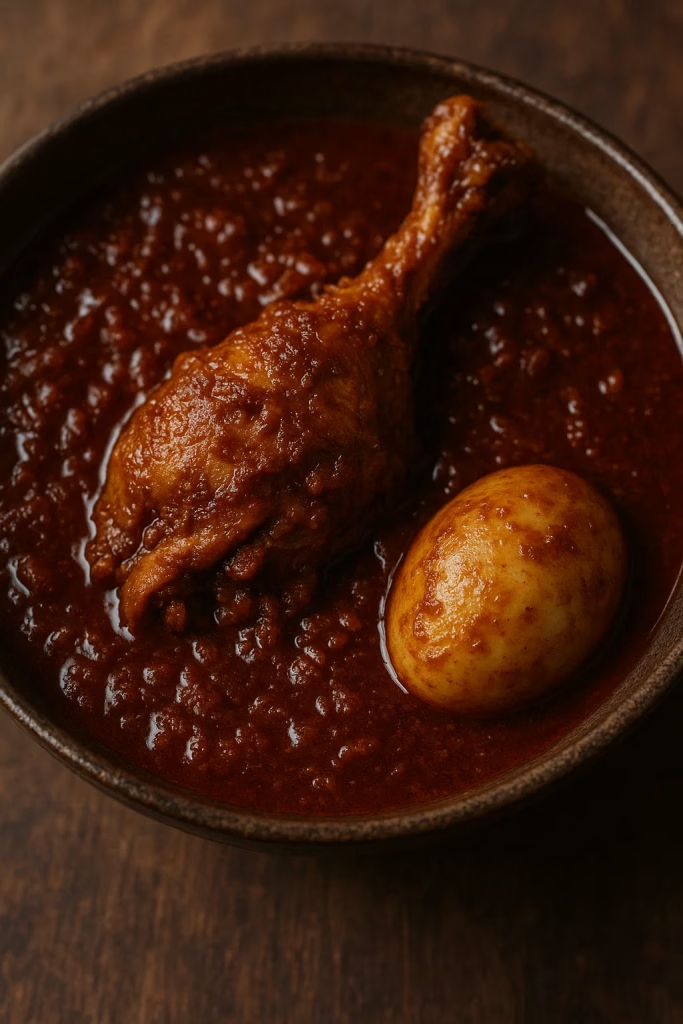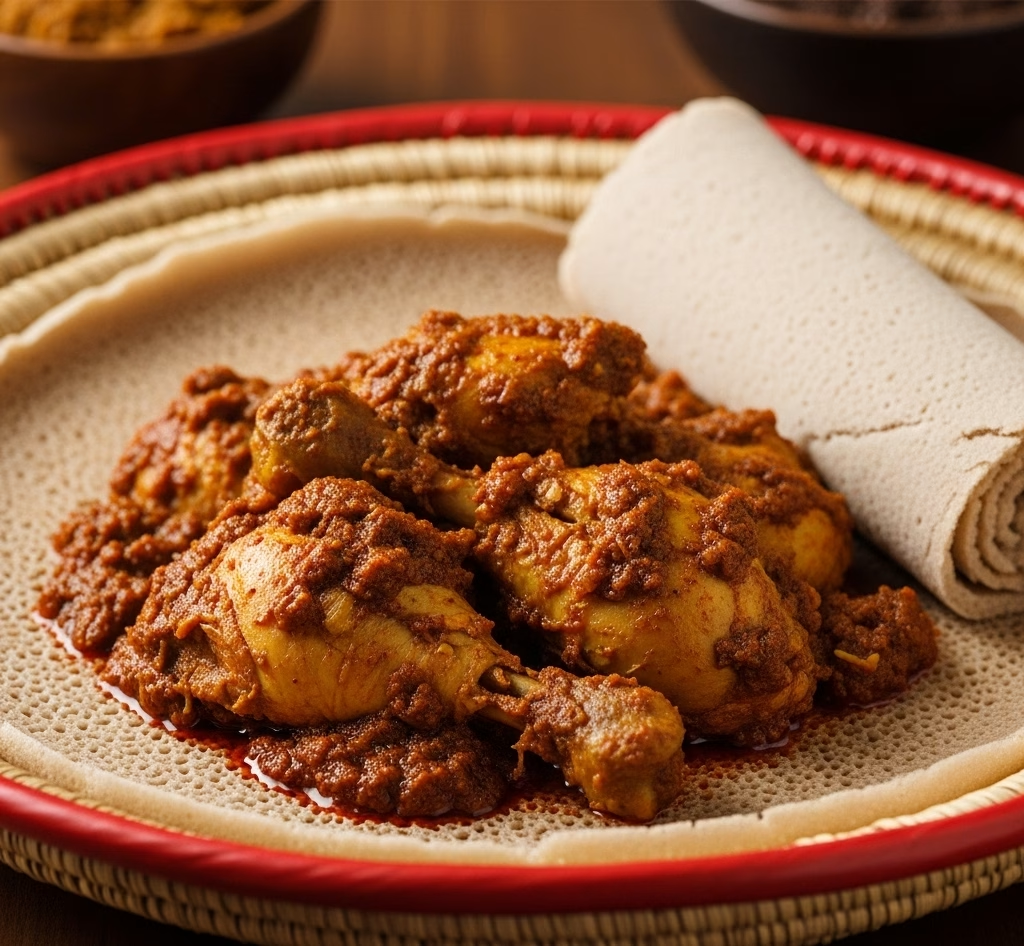Doro Wat, also known as Ethiopian chicken stew, is a rich, spicy, and deeply flavorful dish that is a cornerstone of Ethiopian cuisine. It features tender chicken simmered in a robust, aromatic sauce made with berbere spice, onions, garlic, and clarified butter called niter kibbeh. Traditionally served with injera, a sourdough flatbread, Doro Wat is a festive dish enjoyed during special occasions and holidays. This stew beautifully balances heat, depth, and texture, making it a favorite among those seeking authentic Ethiopian flavors.
Table of Contents
Ingredients
- 2 lbs chicken drumsticks or thighs (skin removed, bone-in preferred)
- 3 large red onions, finely chopped
- 4 cloves garlic, minced
- 2 tablespoons ginger, minced
- 3 tablespoons berbere spice blend (Ethiopian spice mix)
- 1/4 cup niter kibbeh (Ethiopian spiced clarified butter) or substitute with ghee/butter
- 1/4 cup vegetable oil or olive oil
- 1/2 cup water or chicken broth
- 3 hard-boiled eggs (optional but traditional)
- Juice of 1 lemon
- Salt, to taste
- Freshly ground black pepper, to taste
Serves
This recipe serves 4 to 6 people depending on portion size and accompaniments.
Step-by-Step Instructions
Step 1: Prepare the Chicken
- Remove skin from the chicken pieces for traditional authenticity.
- Rinse the chicken under cold water, then pat dry.
- Marinate with lemon juice and a pinch of salt, set aside for 10-15 minutes.
Step 2: Cook the Onions
- In a large heavy-bottomed pot or Dutch oven, heat oil over medium heat.
- Add the finely chopped onions and cook slowly, stirring occasionally.
- This step requires patience — cook the onions until they become very soft, deeply caramelized, and brown (approximately 30-40 minutes). Avoid rushing by increasing heat; slow cooking brings out sweetness.
Step 3: Add Garlic, Ginger, and Berbere
- Stir in minced garlic and ginger, cook for another 2-3 minutes until fragrant.
- Add the berbere spice blend and continue stirring for 2-3 minutes, allowing the spices to bloom and coat the onions well.
Step 4: Incorporate Niter Kibbeh (or Butter)
- Add the niter kibbeh or butter to the mixture, stirring to melt and blend all flavors.
- This ingredient is crucial as it adds depth and richness with subtle aromatic notes.
Step 5: Add Chicken and Simmer
- Add the chicken pieces to the pot and coat them evenly with the onion-spice mixture.
- Pour in the water or chicken broth, cover, and reduce the heat to low.
- Let it simmer gently for 45 minutes to 1 hour, stirring occasionally.
- The chicken should become tender and the sauce thick and intense.
Step 6: Add Hard-Boiled Eggs (Optional)
- Pierce the hard-boiled eggs with a fork to allow the sauce to seep in.
- Add the eggs into the stew during the last 10-15 minutes of cooking, letting them absorb the spicy flavors.
Step 7: Final Taste and Adjust
- Taste and adjust salt and pepper if needed.
- The stew should be thick, vibrant red, and fragrant.

Serving Suggestions
Doro Wat is traditionally served with injera, a large sourdough flatbread made from teff flour. Tear a piece of injera, scoop some stew with it, and enjoy. The sourness of injera complements the rich, spicy stew perfectly.
- Serve with wat, a vegetable side dish like atkilt wat (cabbage, carrots, potatoes stew).
- Offer additional sides such as lentils or greens.
- Garnish with fresh cilantro or chopped green onions if desired.
Tips for Perfect Doro Wat
- Slow Cook the Onions: Patience is key. Properly caramelized onions form the flavor base.
- Use Authentic Berbere: The signature Ethiopian spice blend gives Doro Wat its heat and complexity.
- Niter Kibbeh: This spiced clarified butter adds authentic aroma and richness.
- Simmer Low and Slow: Gentle cooking keeps the chicken tender and allows flavors to meld.
- Adjust Spice Level: Berbere can vary in heat; start with less if you prefer milder stew.
Healthier Alternatives
- Use skinless chicken breast for leaner protein, though it might be less tender.
- Replace niter kibbeh with olive oil or avocado oil to reduce saturated fat.
- Reduce the amount of oil and butter used.
- Serve with whole grain injera or substitute with gluten-free flatbreads for dietary restrictions.
- Incorporate more vegetables like carrots and potatoes to bulk the stew.
Creative Variations
- Vegetarian Doro Wat: Replace chicken with mushrooms or chickpeas for a hearty vegan version.
- Spicy Variation: Add more berbere or fresh chili peppers for increased heat.
- Smoky Flavor: Add smoked paprika or smoked chili powder for a smoky twist.
- Herbal Infusion: Toss in fresh herbs like rosemary or thyme during simmering.
- Coconut Doro Wat: Add a splash of coconut milk near the end for a creamy, tropical touch.
Common Mistakes to Avoid
- Rushing Onion Cooking: Skipping slow caramelization results in less flavor.
- Overcooking Chicken: High heat and overcooking cause tough meat.
- Using Too Much Water: Excess liquid dilutes the stew’s rich flavor.
- Skipping Niter Kibbeh: Missing this ingredient drastically alters the authentic taste.
- Under-seasoning: Berbere and salt must be balanced; taste frequently.
History of Ethiopian Doro Wat
Ethiopian cuisine is renowned for its unique flavors and communal dining traditions, with Doro Wat standing as one of its most beloved dishes. The origins of Doro Wat trace back to Ethiopia’s rich cultural heritage where slow-cooked stews, or ‘wat,’ have been a dietary staple for centuries. The word ‘Doro’ means chicken in Amharic, while ‘Wat’ refers to a spicy stew. This dish has been passed down through generations and is a centerpiece in Ethiopian festivities such as Easter and Christmas.
The use of berbere spice in Doro Wat showcases Ethiopia’s extensive spice trade history. Berbere blends a mix of chili peppers, garlic, ginger, fenugreek, and other aromatic spices, symbolizing the country’s diverse agricultural bounty. The stew also reflects Ethiopia’s Orthodox Christian fasting traditions, where variations without meat or dairy are consumed during fasting periods, making Doro Wat a special treat during non-fasting days.
Traditionally, Doro Wat is enjoyed communally, served atop injera with family and friends sharing from a large platter. This emphasizes Ethiopian hospitality and the significance of shared meals in bonding and cultural expression. Over time, Ethiopian diaspora communities have popularized Doro Wat worldwide, introducing its distinct taste and rich history to global food enthusiasts.
FAQs about Ethiopian Doro Wat
1. What is berbere spice?
Berbere is a traditional Ethiopian spice blend made with chili peppers, garlic, ginger, fenugreek, coriander, cinnamon, and other spices, providing a complex heat and flavor profile.
2. Can I use boneless chicken for Doro Wat?
Yes, but bone-in chicken is preferred for more flavor and tenderness.
3. What can I substitute for niter kibbeh?
You can substitute with ghee, clarified butter, or spiced butter made with garlic and herbs.
4. Is Doro Wat very spicy?
It can be spicy depending on the amount of berbere used, but you can adjust the heat to your taste.
5. What is injera?
Injera is a sourdough flatbread made primarily from teff flour, used to scoop up Doro Wat and other Ethiopian dishes.
6. Can I make Doro Wat ahead of time?
Yes, it tastes even better the next day as the flavors deepen.
7. How do I store leftover Doro Wat?
Store in an airtight container in the refrigerator for up to 3 days.
8. Can I freeze Doro Wat?
Yes, freeze in portions for up to 3 months; thaw and reheat gently.
9. What is niter kibbeh made of?
Niter kibbeh is clarified butter infused with spices like cardamom, cinnamon, cumin, and garlic.
10. Is Doro Wat gluten-free?
Yes, the stew itself is gluten-free, but traditional injera may contain gluten unless made from 100% teff flour.
Ethiopian Doro Wat is more than just a chicken stew; it’s a cultural emblem, a celebration of spices, patience, and communal dining. Its deep, layered flavors born from slow-cooked onions, aromatic spices, and tender chicken make it a dish worth savoring and sharing. Whether you prepare it for a festive occasion or a family meal, mastering Doro Wat opens a delicious window into Ethiopian culinary tradition. By respecting the authentic techniques and ingredients, and allowing yourself to experiment with variations, you can bring the warmth and spice of Ethiopia’s kitchens right into your home. Enjoy this hearty, soul-satisfying stew with injera or your favorite flatbread, and savor a taste of Ethiopia’s rich heritage.


